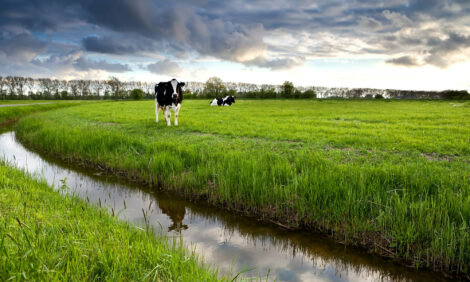



New study identifies genomic pathway to healthier, more productive dairy cattle
A study by Synomics, the biological insights business, has identified a pathway for improving the accuracy with which key economic production, health and fertility traits can be predicted in dairy cattle by using a completely new approach to analyzing variations within the genome.With an increasing focus on the economic, social and environmental impact of dairy cattle and other livestock, the ability to select for healthier cattle that produce higher quality milk has taken on a new level of importance. It is similarly important in how selection can be used to reduce damaging methane emissions.
Perhaps the most significant finding from the study was the increase Synomics was able to realize in the heritability (a key element of genetic selection) of traits such as mastitis-resistance and 1st time pregnancy, which had previously been too low to justify inclusion in many genetic selection programs. Synomics was able to increase heritability of these traits to a level where genetic selection can now be undertaken using smaller datasets, potentially transforming the way elite dairy cattle are identified.
These results were made possible through the use of Synomics’ proprietary combinatorial analytics platform, which analyzed data from 4,000 dairy cattle to identify high-order combinations of Single Nucleotide Polymorphisms (SNPs – pronounced ‘Snips’) which Synomics then maps to key genes. In this study, findings from the four health, productivity and fertility traits identified 13-117 critical SNPs which mapped to between six and 31 genes.
Whereas genes may be easy to find, and each one may contain many hundreds of SNPs, being able to single out the SNPs that sit inside or outside those genes and orchestrate the gene function and, crucially, regulate the associated traits, is the holy grail.
It is these SNPs that provide the pathway for identifying cattle that can be bred to be healthier, more disease resistant, and deliver higher yields. An added benefit is that these insights can also empower scientists with the information needed to develop new drugs and treatments, for example to treat or prevent various conditions or diseases such as lameness or mastitis.
Identifying a small number of high-impact SNPs is much more valuable to scientists than simply identifying a large number of SNPs. By applying Synomics’ platform, scientists are enabled to target genes for intervention with more certainty and bring products/solutions to market more rapidly and at less expense.
Whilst current state-of-art practices are limited to looking at the impact of each individual SNP in isolation, scientists know that many traits are the result of SNPs (and genes) acting in complex combinations. Synomics is able to analyze and map these combinations, identifying previously disregarded SNPs as highly relevant.
In this particular study, Synomics was able to find 13-117 relevant SNPs despite small sample sizes and high SNP chip densities. Indeed, increasing SNP density (777k and 59m low pass sequence) found more novel signals.
Synomics’ technology is then able to convert these findings into an industry-standard genetic evaluation model, that showed a step-change improvement in key metrics as well as a materially wider distribution of animals. This results in an increased genetic gain in dairy cattle breeding.
Peter Kristensen, CEO of Synomics, says the business is in many respects the missing link between the raw data that farmers and scientists hold and a company’s own research and develop team: “We interpret the data and lead the team quickly to areas of immediate interest,” he explains. “With our in-house team of experts, Synomics is also able to support smaller teams in a more hands-on manner, opening the possibility of implementing advanced genomic selection to a wider audience.”
The biological insights Synomics delivers are achieved by using its proprietary combinatorial Insights Platform that has been adapted from a technology already proven to find new treatment opportunities for unmet medical needs across a range of diseases in humans.
Peter says the business has developed the platform to enable animal and crop scientists and producers to get a better understanding of what drives key production traits and innovate accordingly: “We are giving scientists, farmers and food producers the ability to learn more about the animals they breed with insights they have not been previously able to liberate from the data they already hold.”
*The science:
Applying the Synomics’ platform identified significant areas for improvement in genetic selection:
- 9% Reduction in prediction error
- 15% increase in phenotype prediction accuracy
- 25% increase in genomically enhanced breeding value (gEBV) reliability
- 30% Increase in heritability


